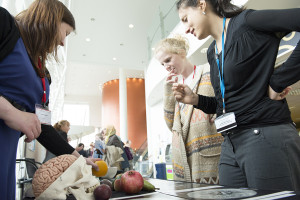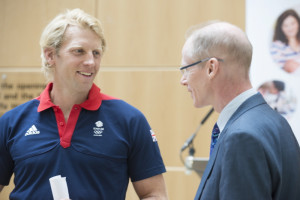
OLYMPIC gold medallist Andrew Triggs Hodge was among hundreds of visitors to our research open day at the John Radcliffe Hospital yesterday.
Teams from the National Institute for Health (NIHR) Oxford Biomedical Research Centre demonstrated pioneering science and its impact on healthcare to patients, public and staff.
Interactive exhibitions allowed visitors to get hands on with technology and techniques, tackle experiments and even try their hand at surgery.
Double Olympic gold medal winning rower Andrew Triggs Hodge lent his support to the event and gave a short speech.
Mr Triggs Hodge, who was part of the victorious mens four at London 2012, was given an overview of neuroscience research by Professor Peter Brown and toured the cardiovascular stand with Oxford Biomedical Research Centre director Professor Keith Channon.
The Oxford-based Olympian said: “We take it for granted that this is on our doorstep in Oxford. When you look at it from the outside, we are envied across the world.”

Leading researchers were on hand throughout the day to answer questions on everything from how genetic sequencing is improving treatment to how mobile phones and iPads could revolutionise the hospital ward.
The NIHR Oxford Biomedical Research Centre is a collaboration between Oxford University Hospitals NHS Trust and Oxford University to support patient-centred research. It is investing more than £100m over five years in research across many important areas of medicine, including diabetes, cancer, heart disease and stroke.
Professor Channon said: “We have much to be proud of through the excellent work of BRC-supported researchers across the Oxford University Hospitals and Oxford University partnership. I am sure the Open Day helped to emphasise the importance of clinical research to the public and our patients, and the vital role they play in that work.”
Oxford Biomedical Research Centre’s next public talk will be held on July 3 where clinical neurologist Professor Peter Rothwell will outline leading stroke and related dementia research, how it is developing earlier recognition of those at risk, improving diagnosis and developing more effective use of existing preventive treatments. The talk is at the Nuffield Orthopaedic Centre at 6.30pm.